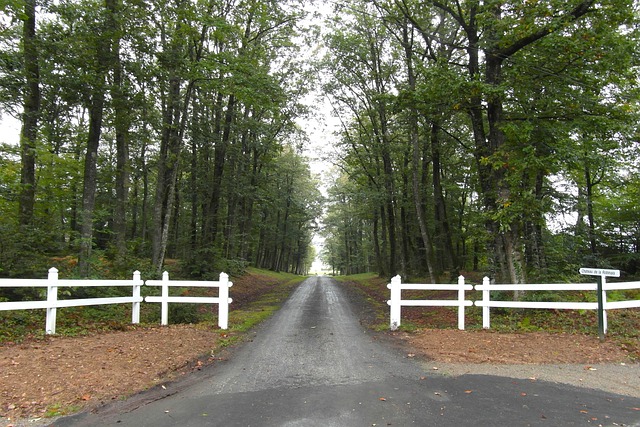When choosing a residential driveway, homeowners must consider various factors including material durability, climate resilience, design flexibility, cost, and maintenance requirements. Asphalt and concrete are popular choices due to their combination of strength, longevity, and aesthetic versatility. Asphalt offers a budget-friendly, easy-to-repair surface that adds a sleek look to your home, while concrete provides a longer lifespan with resistance to temperature changes. For those seeking personalized design, concrete can be colored or stamped to match specific tastes. Interlocking pavers offer the most variety in appearance, closely mimicking natural stone for an upscale feel. Eco-conscious options like permeable paving systems are available for those interested in sustainable water management. The choice of material should align with your home's architectural style, local climate, and personal preferences to ensure a driveway that is both functional and visually pleasing, enhancing your property's value and curb appeal.
When considering the enhancement or installation of a driveway, both residential and commercial property owners face unique yet equally significant decisions. This article delves into the intricacies of driveway paving, offering insights into the various materials and design considerations that ensure functionality, safety, and visual appeal. From the durability of asphalt to the elegance of concrete, we explore the options available for homeowners looking to complement their property’s aesthetic while providing a sturdy entry point. For businesses, the driveway serves as a critical component of daily operations, necessitating materials and designs that can handle heavy traffic and comply with local regulations. We guide readers through the process from planning to completion, emphasizing cost-effective solutions that balance budgetary constraints with the need for quality and longevity. Whether you’re seeking to pave a new driveway or refurbish an existing one, this comprehensive overview provides valuable tips and considerations for making informed decisions about your driveway paving project.
- Understanding Residential Driveway Paving Options
- – Types of Materials for Home Driveways
- – Factors Influencing Residential Driveway Paving Choices
- – Importance of Durability and Aesthetics in Residential Driveways
Understanding Residential Driveway Paving Options

When considering residential driveway paving options, homeowners have a variety of materials to choose from, each with its own set of benefits and maintenance requirements. Asphalt driveways are a popular choice due to their affordability and ease of installation; they provide a smooth, durable surface that can be easily maintained and repaired if necessary. Alternatively, concrete is another durable option that offers a longer lifespan than asphalt, resisting cracking from temperature changes. Homeowners should also consider the aesthetic appeal of their driveway, as different materials come in various colors and finishes, enhancing the curb appeal of their property. Additionally, the choice between asphalt and concrete may depend on factors such as local climate conditions, usage frequency, budget constraints, and personal preference, all of which play a crucial role in determining the best option for an individual’s specific needs. Proper preparation and base installation are essential to ensure longevity and performance of the driveway, making it important to engage with experienced paving contractors who can guide you through the process and help select the most suitable material for your residential driveway paving project.
– Types of Materials for Home Driveways

When considering a new driveway or resurfacing an existing one, homeowners have a variety of materials to choose from, each with its own set of advantages and aesthetics. Asphalt, a popular choice for residential driveways, offers a durable and low-maintenance surface that can be installed quickly, providing a smooth, dark finish that’s ideal for both functional use and curb appeal. Concrete is another widely used material; it’s known for its longevity, strength, and the ability to be colored or stamped for a custom look. Interlocking pavers, which include bricks or stones laid in a pattern with sand and joint stabilizers, offer versatility in design and can mimic the look of natural stone, adding a touch of sophistication to any home. Each material requires careful consideration based on local climate conditions, usage patterns, and personal taste to ensure the driveway stands up to the test of time and use.
– Factors Influencing Residential Driveway Paving Choices

When homeowners consider residential driveway paving, several factors significantly influence their final choice. Climate conditions are paramount; materials like asphalt or concrete must withstand local weather patterns effectively to ensure longevity and safety. The size of the vehicle fleet a household operates also plays a role—larger vehicles necessitate more robust and spacious driveways. Aesthetic preferences are equally important, with some homeowners favoring the classic look of asphalt, while others may opt for brick pavers for their visual appeal. Additionally, maintenance requirements and cost considerations are critical; certain materials demand less upkeep but may come with a higher initial investment. Homeowner associations or local zoning laws might also dictate acceptable driveway materials, further narrowing the options available.
Ease of installation, durability, and environmental impact are also key factors in residential driveway paving decisions. Preference for quick, hassle-free installation may lead to the selection of pre-cast concrete pavers or asphalt, both of which can be installed relatively swiftly. However, homeowners who prioritize sustainability might lean towards porous asphalt or permeable interlocking concrete paving systems that manage stormwater runoff effectively. Moreover, the choice between DIY and professional installation impacts the decision, with some materials lending themselves better to a do-it-yourself approach than others. Ultimately, the driveway’s purpose extends beyond vehicle parking; it can enhance the curb appeal of the property and contribute to its overall value.
– Importance of Durability and Aesthetics in Residential Driveways

When selecting materials for residential driveway paving, both durability and aesthetics play pivotal roles in ensuring a harmonious blend of functionality and curb appeal. Driveways are subject to heavy vehicular traffic and varied weather conditions, necessitating materials that withstand these elements without frequent repairs or replacements. Concrete and asphalt are popular choices due to their longevity and ability to endure years of use. Concrete driveways offer a range of finishes, from the classic gray to stamped or dyed options that can enhance the visual appeal of a home’s exterior. On the other hand, asphalt provides a smooth, dark surface that complements various architectural styles and is cost-effective for many homeowners. Additionally, the choice of driveway material can significantly influence property value, as potential buyers often view a well-maintained driveway as an indicator of the home’s overall upkeep. Opting for a durable material with an aesthetically pleasing design ensures that the residential driveway remains a functional and visually appealing entry point to a home for years to come.
When considering the paving of residential or commercial driveways, it’s clear that a blend of durability, aesthetic appeal, and suitable material selection plays a pivotal role in ensuring a lasting first impression. As discussed, various materials—from traditional asphalt to modern concrete, plus eco-friendly options like permeable pavers—offer distinct advantages tailored to different needs and preferences. Homeowners and businesses alike must weigh factors such as climate, traffic volume, budget, and maintenance requirements when choosing the best driveway paving solution. Ultimately, a well-paved driveway serves as an inviting gateway to any property, underscoring the importance of making an informed decision. For those looking to enhance their property’s curb appeal and functionality, understanding the options available in driveway paving is essential for achieving long-lasting results that blend both practicality and beauty.
